Over half of all adults living in the United States have one or more chronic health conditions, according to the latest information from the Centers for Disease Control and Prevention (CDC). Chronic illnesses—such as diabetes, heart disease, and cancer—cause more deaths and disabilities and cost more than other medical conditions. Every year, seven out of 10 deaths can be linked to chronic illnesses.
Now, there could be a way to predict your likelihood of developing a chronic condition in the future. If you and your doctor know you’re more at risk, steps could be taken to prevent or delay the disease from progressing. Ultimately, this could increase your quality of life and reduce costs for you and our nation’s healthcare system.
ICHRON predicts your risk
Researchers at Intermountain Medical Center Heart Institute in Salt Lake City, Utah, led by Heidi May, Ph.D., MSPH, have designed and tested a new clinical tool that they claim can accurately predict a person’s risk of developing a chronic illness. The tool, called the Intermountain Chronic Disease Risk Score (ICHRON), calculates your at-risk score by using data from your personal electronic health record, including information from routine blood tests and your age. This makes it easy to integrate ICHRON as a screening method into your routine medical examinations or appointments.
Your ICHRON at-risk score can be used to predict your risk of developing a number of chronic diseases, including:
- Diabetes
- Chronic obstructive pulmonary disease (COPD)
- Kidney failure
- Dementia
ICHRON can also be used to measure your risk of developing several cardiovascular diseases, such as peripheral vascular disease, stroke, atrial fibrillation, heart attack, and heart failure.
Accurate predictions empower patients with information
According to the published results of the study, female patients with moderate ICHRON scores were shown to be three times more likely to develop a chronic illness within the next three years compared to female patients with low ICHRON scores. Women with high ICHRON at-risk scores were 11 times more likely to be diagnosed with a chronic illness within three years.
Similarly, men with moderate at-risk scores showed a 5.6 times greater likelihood of developing a chronic illness within three years, compared to low-scoring male patients. Men with high ICHRON scores were 14 times more likely to be diagnosed with a chronic illness.
Ultimately, the research team concluded that ICHRON’s predictions were 77%-78% accurate in predicting which patients are at a higher risk for the development of chronic illnesses.
Possible benefits of knowing your ICHRON score
Two specific chronic illnesses (heart disease and cancer) cause a disproportionate number of deaths in the U.S. The developers of the ICHRON tool hope it will help both you and your doctor make lifestyle and treatment decisions that help postpone or prevent chronic illnesses. If you know your risk, you might be more inspired to live a healthier life or take proactive steps to learn to manage your illness.
Prevention efforts started early might also make it possible for you to avoid the complications that often occur due to chronic illnesses. Additionally, taking steps to prevent these diseases from developing can save you (and the healthcare system at large) substantial amounts of money. Consider that, in 2010 alone, the top five chronic conditions—heart disease, cancer, COPD/asthma, diabetes, and hypertension—cost almost $347 billion, or 30% of all health care spending.



